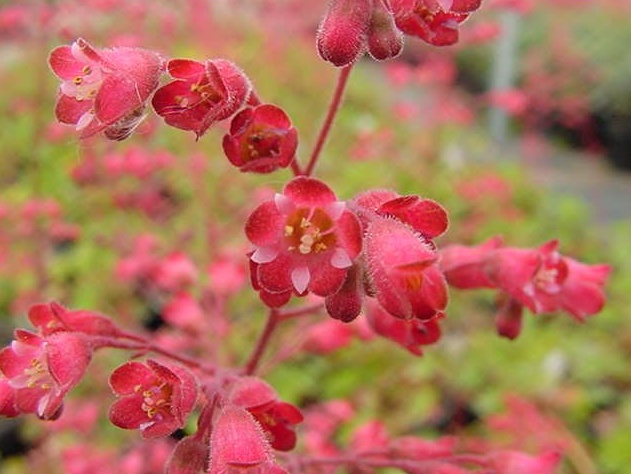| Botanical Name: Heuchera 'Santa Ana Cardinal' | |
| Common Name: Santa Ana Cardinal Coral Bells |

-
Anatomy
-
Culture
-
Design
Plant Type
Ground cover, Perennial
Height Range
1-3'
Flower Color
Pink, Red
Flower Season
Spring
Leaf Color
Green
Bark Color
n/a
Fruit Color
n/a
Fruit Season
n/a
Sun
Half, Shade
Water
Low, Medium
Growth Rate
Moderate
Soil Type
Clay, Loam
Soil Condition
Average, Rich, Well-drained, Dry
Soil pH
Neutral
Adverse Factors
n/a
Design Styles
English Cottage, Formal, Ranch
Accenting Features
Showy Flowers, Unusual Foliage
Seasonal Interest
Summer, Fall
Location Uses
Entry, Perennial Border, Shrub Border, Foundation, Parking Strip, Raised Planter, Walkways
Special Uses
Container, Cut Flowers, Mass Planting, Small Spaces
Attracts Wildlife
Hummingbirds
Information by: Stephanie Duer
Photographer: Steve Mullany
Photographer: Steve Mullany
-
Description
-
Notes
This Heuchera is believed to be a hybrid between the native Heuchera maxima and the non-native Heuchera sanguinea. The name is a little misleading as the flower is more pinkish red than it is red or cardinal. It grows to 18"-24" tall and wide. It looks great in mass plantings.
Grow in well drained soil in full sun to light shade (depending on the variety). When planted in full sun, they do best when not situated where it is very hot, such as against walls or by sidewalks. Ideally, plant in loamy soils, in dry shade to part shade conditions. Remove entire stalk after flowering to encourage continued bloom. In our cold winters, Heuchera crowns can heave above the soil line. Mulching after the ground freezes hard, will prevent the freezing and thawing that pushes the plants up. Check periodically to make sure the roots are not exposed. Replant, if possible. Some varieties are listed as evergreen; in our climate, it depends on the variety, the winter, and where they are planted. But even if not evergreen, the foliage carries well into the fall and early winter months. They do not do well in damp soils. It is susceptible to mealy bugs and root rot if it receives too much water.